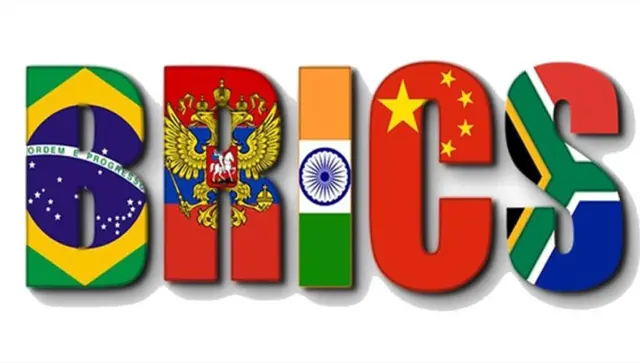*Author: Prof. Engr. Zamir Ahmed Awan, Founding Chair GSRRA, Sinologist (ex-Diplomat), Editor, Analyst, and Non-Resident Fellow of CCG (Center for China and Globalization). (E-mail: [email protected]). *
BRICS is an abbreviation for five regional economies: Brazil, Russia, India, China, and South Africa. The first four were initially grouped as "BRIC" in 2001. But South Africa joined in 2010 and it is termed BRICS. The BRICS have a combined area of 39,746,220 Square Kilometers and an estimated total population of about 3.21 billion, or about 26.7% of the world's land surface and 41.5% of the global population. Brazil, Russia, India, and China are among the world's ten largest countries by population, area, and GDP (PPP), and the latter three are widely considered to be current or emerging superpowers. All five states are members of the G20, with a combined nominal GDP of US$28.06 trillion, a total GDP (PPP) of around US$56.65 trillion, and an estimated US$4.46 trillion in combined foreign reserves.
The BRICS were originally identified for the purpose of highlighting investment opportunities and had not been a formal intergovernmental organization. Rapidly changing geopolitics has led them to have increasingly formed into a more cohesive geopolitical bloc, with their governments meeting annually at formal summits and coordinating multilateral policies; China hosted the most recent 14th BRICS summit on 24 July 2022. Bilateral relations among the BRICS are conducted mainly on the basis of non-interference, equality, and mutual benefit.
The BRICS are considered the foremost geopolitical rival to the G7 bloc of leading advanced economies, announcing competing initiatives such as the New Development Bank, the Contingent Reserve Arrangement, the BRICS payment system, the BRICS Joint Statistical Publication, and the BRICS basket reserve currency. Since 2022, the group has sought to expand membership, with several developing countries expressing interest in joining that includes Iran, Argentina, Saudi Arabia, United Arab Emirates, Egypt, Algeria, Mexico, Nigeria, Bahrain, Indonesia, Afghanistan, Bangladesh, Belarus, Kazakhstan, Mexico, Nicaragua, Nigeria, Pakistan, Senegal, Sudan, Syria, Thailand, Tunisia, Turkey, Uruguay, Venezuela, and Zimbabwe. It might turn into BRICS Plus, which will be the most powerful bloc in the emerging world, as an economic power, based on Area and population, in all respect, it will be a strong bloc just after the UN. It will definitely play a vital role in the global economy, development, and security. It will replace many existing concepts and structures in place for a long, but failing to deliver the expectations, it is time to update the software and serve humankind in a much more effective manner.
The current currency crisis and monopoly of Dollars have led BRICS countries to find a sustainable solution. They will likely discuss the feasibility of a new common currency or similar at the 2023 BRICS summit in South Africa. Fair and easier international trade as well as a major reduction in costs of transactions would be some of the reasons why the countries could forge a currency union, according to Mikatekiso Kubayi, a BRICS specialist. Former White House senior advisor Joseph W. Sullivan, writing for the American magazine Foreign Policy, asserted that "a BRICS-issued currency would be different", as it would be comprised of challengers to the Western-led international that "in the order, the scale of GDP, now collectively outweigh not only the reigning hegemon, the United States, but the entire G-7 weight class put together." Sullivan maintains that the BRICS would also be poised to achieve a level of self-sufficiency in international trade that has eluded other currency unions, such as the Eurozone, because of the geographic diversity of its members, which enables a broader range of goods and services.
The future of BRICS is very bright as it has the potential to reshape the global order and will serve humankind. People are fed up with the old hegemonies and supremacies of the past and wanted to rebel against them. BRICS may provide an appropriate platform, where the destiny of many nations is supposed to be changed completely. The most interesting thing is that although China and Russia are the big and strong countries in the group, all decisions are made based on consensus among all members. There is no monopoly or hegemony of any single country. Collective wisdom prevails among the group members. It is well conceived that the alliance has emerged as a resistance to current hegemonies and mishandling of the developing world, BRICS will avoid any such evil practices.
(ASIA PACIFIC DAILY)
 简体中文
简体中文

